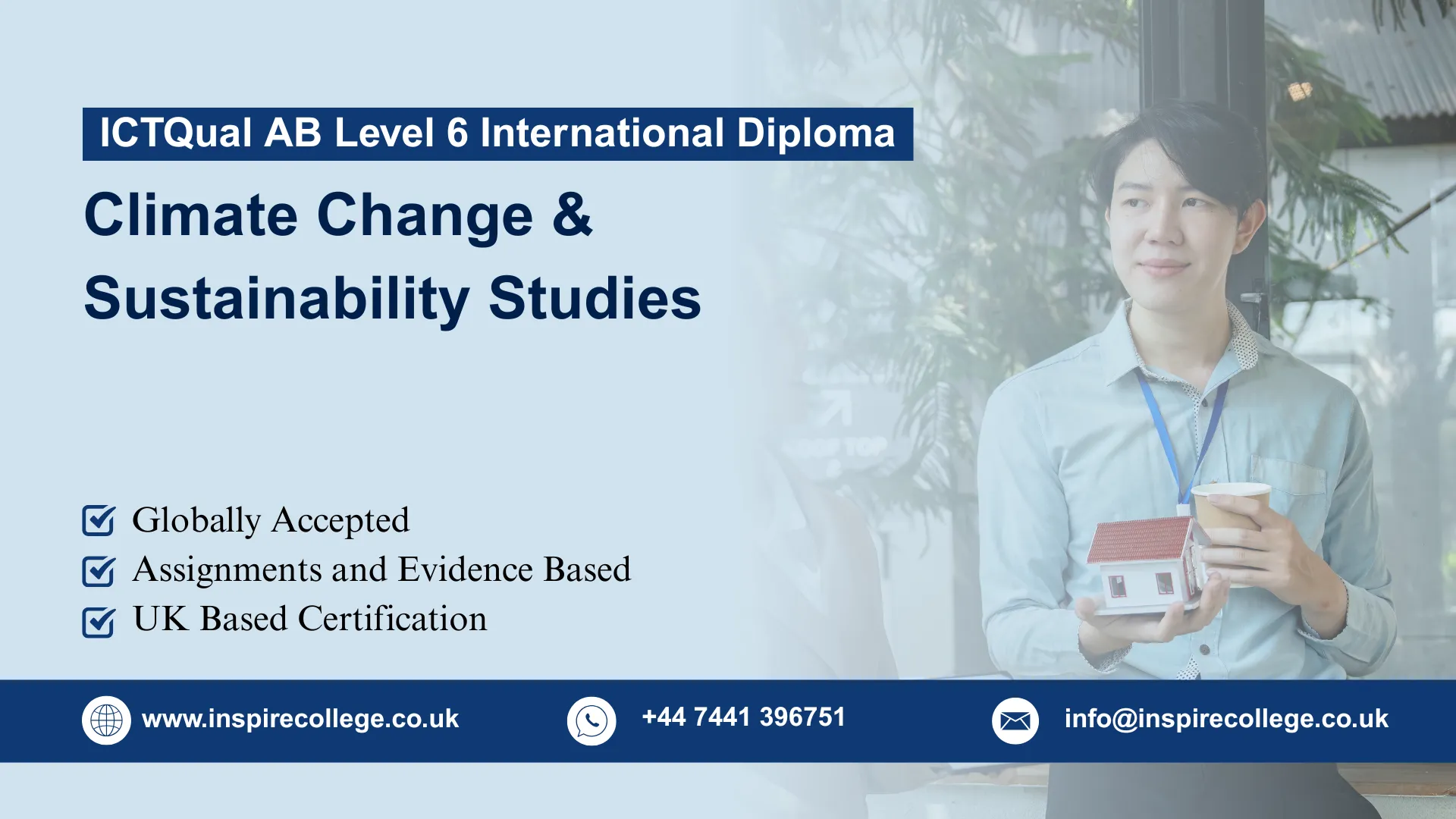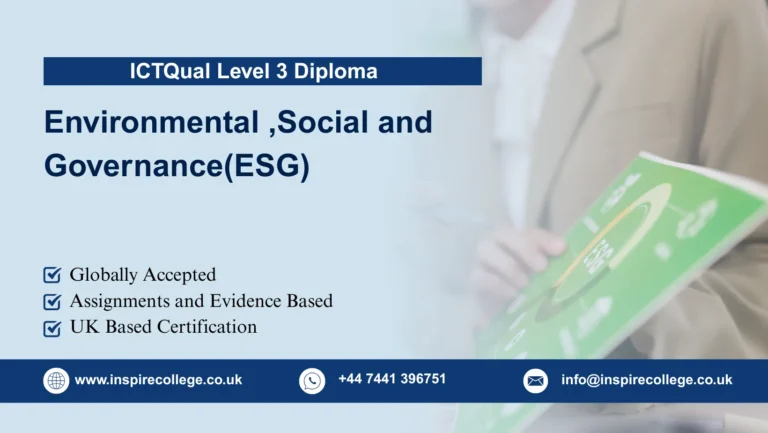
ICTQual AB Level 6 International Diploma in Climate Change & Sustainability Studies
The ICTQual AB Level 6 International Diploma in Climate Change & Sustainability Studies is a globally recognised programme designed to equip learners with advanced knowledge and practical skills to address pressing environmental challenges. This three-year, 360-credit programme provides comprehensive training in climate science, sustainability strategies, environmental policy, and sustainable development practices.
Learners will explore critical areas such as climate change mitigation, adaptation strategies, renewable energy technologies, sustainable resource management, and environmental governance. The curriculum combines theoretical frameworks with practical applications, empowering learners to implement sustainability initiatives, assess environmental impacts, and develop evidence-based strategies for organisations, communities, and governments.
Ideal for both fresh graduates and experienced professionals, the diploma prepares learners for careers in environmental consultancy, sustainability management, policy development, climate risk assessment, and corporate social responsibility. Graduates gain expertise in strategic planning, research, and leadership, enabling them to influence environmental policy, lead sustainability projects, and promote climate resilience.
By enrolling with our ICTQual AB Approved Training Centre, learners access internationally recognised credentials, expert guidance, and comprehensive study materials. Completion of this diploma enhances career prospects locally and globally, preparing professionals to address climate change challenges, implement sustainable solutions, and support organisations in achieving environmental compliance and long-term sustainability goals.
Advance your career and make a meaningful impact on the planet with the ICTQual AB Level 6 International Diploma in Climate Change & Sustainability Studies – a qualification designed to meet the growing global demand for skilled sustainability and climate change professionals.
To enrol in the ICTQual AB Level 6 International Diploma in Climate Change & Sustainability Studies, learners must meet the following criteria:
- Age Requirement: Learners must be at least 18 years old.
- Educational Background:
- A relevant Level 5 qualification in environmental studies, sustainability, climate science, or related fields is preferred.
- Fresh learners with secondary or vocational education in science, engineering, management, or environmental studies are also eligible.
- Professional Experience:
- For experienced learners, a minimum of 3–5 years of verifiable professional experience in sustainability, environmental management, renewable energy, or related sectors is advantageous.
- Experience in climate policy, environmental consultancy, corporate sustainability, or project management supports fast-tracked learning options.
- Language Proficiency: Learners must have proficiency in English to engage effectively with course materials, assessments, and assignments.
- Computer Literacy: Basic computer skills, including familiarity with MS Office, digital learning platforms, and data analysis tools, are required.
- Commitment to Learning: Learners must be dedicated to completing the three-year, 360-credit programme, including theoretical modules, practical projects, and applied research.
These entry requirements ensure learners are prepared to succeed academically and practically, equipping them with the knowledge and skills to advance careers in climate change mitigation, sustainability management, and environmental leadership at both national and international levels.
Mandatory Units
This qualification, theICTQual AB Level 6 International Diploma in Climate Change & Sustainability Studies, consists of 36 mandatory units.
Year 1 – Foundations of Climate Change & Sustainability
- Introduction to Climate Change Science
- Principles of Sustainability and Environmental Management
- Global Environmental Policies and Governance
- Carbon Footprint and Greenhouse Gas Accounting
- Renewable Energy Fundamentals
- Climate Change Impacts and Adaptation Strategies
- Environmental Ethics and Professional Responsibility
- Sustainable Resource Management
- Environmental Monitoring and Data Analysis
- Introduction to Project Planning in Climate Initiatives
- Environmental Communication and Stakeholder Engagement
- Introduction to Risk Assessment in Environmental Management
Year 2 – Applied Climate Change & Sustainability Practices
- Advanced Climate Change Mitigation Strategies
- Sustainable Urban and Industrial Development
- Environmental Impact Assessment (EIA)
- Carbon Management and Trading
- Energy Efficiency and Renewable Integration
- Climate Policy Implementation and Compliance
- Waste Management and Circular Economy Principles
- Environmental Auditing and Reporting Techniques
- Digital Tools and Technologies for Sustainability
- Organisational Behaviour and Sustainability Leadership
- Research Methods in Climate and Sustainability Projects
- Applied Project Planning and Operational Management
Year 3 – Strategic Leadership in Climate Change & Sustainability
- Strategic Sustainability Leadership
- International Climate Agreements and Standards
- Environmental Risk and Crisis Management
- Corporate Social Responsibility (CSR) and Sustainability Strategy
- Sustainable Supply Chain and Resource Management
- Innovation and Emerging Technologies in Sustainability
- Climate Change Policy Development and Implementation
- Environmental Governance and Ethics in Leadership
- Advanced Project Management for Sustainability Initiatives
- Renewable Energy Systems and Integration Strategies
- Independent Research Project in Climate Change & Sustainability
- Capstone Project: Applied Climate Change & Sustainability Studies
Learning Outcomes for the ICTQual AB Level 6 International Diploma in Climate Change & Sustainability Studies 360 Credits – Three Years:
Year 1 – Foundations of Climate Change & Sustainability
Introduction to Climate Change Science
- Understand the scientific principles underlying climate change, including atmospheric processes and global climate systems.
- Analyse historical and current climate trends using data-driven approaches.
- Identify key drivers of climate change and their environmental and societal impacts.
- Evaluate the role of science in informing climate policy and mitigation strategies.
Principles of Sustainability and Environmental Management
- Define sustainability concepts and the triple bottom line approach (environmental, social, economic).
- Apply environmental management principles to organisational and community contexts.
- Analyse sustainability challenges and opportunities across different sectors.
- Develop strategies for integrating sustainable practices into operational processes.
Global Environmental Policies and Governance
- Understand international and national environmental policies, treaties, and regulatory frameworks.
- Analyse governance structures and their effectiveness in promoting sustainability.
- Evaluate the role of stakeholders in implementing environmental policy.
- Assess the impact of policy decisions on climate change mitigation and adaptation.
Carbon Footprint and Greenhouse Gas Accounting
- Measure and calculate carbon footprints for organisations, projects, or communities.
- Apply greenhouse gas accounting methodologies and reporting standards.
- Analyse data to identify emissions hotspots and reduction opportunities.
- Develop strategies to reduce carbon emissions and enhance energy efficiency.
Renewable Energy Fundamentals
- Understand the principles and technologies of renewable energy sources.
- Analyse the environmental, economic, and social benefits of renewable energy integration.
- Evaluate different renewable energy systems for specific applications.
- Develop basic plans for implementing renewable energy solutions.
Climate Change Impacts and Adaptation Strategies
- Assess the effects of climate change on ecosystems, societies, and economies.
- Apply adaptation frameworks to reduce vulnerability to climate-related risks.
- Analyse sector-specific adaptation strategies (agriculture, urban planning, infrastructure).
- Evaluate the effectiveness of adaptation measures in different contexts.
Environmental Ethics and Professional Responsibility
- Apply ethical principles to sustainability and environmental decision-making.
- Analyse dilemmas in balancing economic, social, and environmental objectives.
- Demonstrate responsibility in professional practice and stakeholder engagement.
- Evaluate the ethical implications of environmental policies and projects.
Sustainable Resource Management
- Understand principles of sustainable resource use, conservation, and circular economy.
- Apply resource management strategies to energy, water, and materials.
- Analyse environmental and social impacts of resource utilisation.
- Develop actionable plans for sustainable resource management in organisations.
Environmental Monitoring and Data Analysis
- Design and implement environmental monitoring programmes.
- Collect, analyse, and interpret environmental data using quantitative and qualitative methods.
- Identify trends, risks, and opportunities for mitigation.
- Report findings in a clear, actionable, and scientifically rigorous manner.
Introduction to Project Planning in Climate Initiatives
- Apply project management principles to climate and sustainability projects.
- Develop project plans, timelines, and resource allocation strategies.
- Monitor and evaluate project progress and performance.
- Implement corrective measures to ensure project objectives are achieved.
Environmental Communication and Stakeholder Engagement
- Develop effective communication strategies for environmental initiatives.
- Engage diverse stakeholders including communities, governments, and NGOs.
- Analyse the effectiveness of communication campaigns and educational programmes.
- Promote public awareness and participation in sustainability efforts.
Introduction to Risk Assessment in Environmental Management
- Identify environmental risks and vulnerabilities in organisational or community contexts.
- Apply risk assessment methodologies to evaluate potential impacts.
- Develop mitigation and contingency strategies.
- Monitor and review risk management plans for continuous improvement.
Year 2 – Applied Climate Change & Sustainability Practices
Advanced Climate Change Mitigation Strategies
- Design and implement mitigation strategies for various sectors and contexts.
- Analyse carbon reduction technologies and renewable energy solutions.
- Evaluate policy instruments and incentives for climate mitigation.
- Develop integrated mitigation plans aligned with organisational or regional goals.
Sustainable Urban and Industrial Development
- Analyse sustainable development principles for urban and industrial environments.
- Apply green building, energy efficiency, and low-impact infrastructure strategies.
- Develop plans for sustainable industrial operations and urban planning.
- Evaluate environmental, social, and economic outcomes of development projects.
Environmental Impact Assessment (EIA)
- Conduct environmental impact assessments for projects and policies.
- Analyse potential environmental, social, and economic effects.
- Develop mitigation measures and monitoring plans.
- Report findings to stakeholders using recognised standards and methodologies.
Carbon Management and Trading
- Understand carbon markets, trading mechanisms, and offset schemes.
- Analyse organisational emissions and develop reduction strategies.
- Apply carbon accounting to support sustainability objectives.
- Evaluate the effectiveness and financial implications of carbon trading initiatives.
Energy Efficiency and Renewable Integration
- Assess opportunities for energy efficiency in buildings, industries, and transport.
- Integrate renewable energy solutions into existing systems.
- Evaluate energy management strategies and performance metrics.
- Develop actionable energy plans to reduce consumption and emissions.
Climate Policy Implementation and Compliance
- Understand national and international climate policies and regulatory frameworks.
- Apply compliance strategies in organisational and project contexts.
- Analyse the effectiveness of policy implementation in achieving sustainability goals.
- Develop recommendations for improved policy integration and enforcement.
Waste Management and Circular Economy Principles
- Apply circular economy and sustainable waste management principles.
- Analyse material flows and identify opportunities for waste reduction and recycling.
- Develop strategies for sustainable production and consumption.
- Evaluate environmental, economic, and social impacts of waste management practices.
Environmental Auditing and Reporting Techniques
- Conduct environmental audits and compliance checks.
- Develop sustainability reports using recognised frameworks and indicators.
- Analyse performance data and identify areas for improvement.
- Communicate audit findings to management and stakeholders effectively.
Digital Tools and Technologies for Sustainability
- Apply digital platforms, software, and data analytics in environmental monitoring and management.
- Explore innovations such as GIS, remote sensing, and IoT for sustainability projects.
- Analyse technological solutions for efficiency and scalability.
- Evaluate the effectiveness of digital tools in environmental decision-making.
Organisational Behaviour and Sustainability Leadership
- Apply leadership principles to promote sustainability in organisations.
- Analyse organisational culture, behaviour, and change management strategies.
- Develop initiatives to embed sustainability into corporate strategy.
- Evaluate leadership effectiveness in driving sustainability performance.
Research Methods in Climate and Sustainability Projects
- Apply qualitative and quantitative research methodologies to environmental studies.
- Design, implement, and analyse sustainability-focused research projects.
- Develop evidence-based recommendations for policy or practice.
- Present findings in a structured, professional format.
Applied Project Planning and Operational Management
- Develop detailed project plans for sustainability initiatives.
- Apply operational management techniques to execute projects efficiently.
- Monitor project progress, risk, and resource allocation.
- Evaluate project outcomes and implement lessons learned for continuous improvement.
Year 3 – Strategic Leadership in Climate Change & Sustainability
Strategic Sustainability Leadership
- Develop and implement strategic sustainability plans at organisational or community levels.
- Apply leadership principles to influence decision-making and stakeholder engagement.
- Analyse long-term environmental, social, and economic outcomes.
- Evaluate effectiveness of sustainability leadership initiatives.
International Climate Agreements and Standards
- Understand global agreements, treaties, and standards related to climate change.
- Apply international guidelines to local and organisational sustainability practices.
- Analyse compliance requirements and reporting obligations.
- Evaluate the impact of international frameworks on national and corporate sustainability strategies.
Environmental Risk and Crisis Management
- Identify, assess, and manage environmental risks and crises.
- Develop contingency and emergency response plans.
- Apply crisis communication and stakeholder coordination strategies.
- Evaluate the effectiveness of risk management and crisis response measures.
Corporate Social Responsibility (CSR) and Sustainability Strategy
- Design CSR strategies aligned with organisational sustainability goals.
- Analyse the social, environmental, and economic impacts of CSR initiatives.
- Implement sustainability strategies to enhance corporate reputation and performance.
- Evaluate CSR programmes and provide recommendations for improvement.
Sustainable Supply Chain and Resource Management
- Apply sustainability principles to supply chain and resource management.
- Analyse environmental and social impacts across the supply chain.
- Develop strategies to enhance resource efficiency and reduce emissions.
- Evaluate sustainability performance within supply chain operations.
Innovation and Emerging Technologies in Sustainability
- Explore innovative technologies for climate change mitigation and sustainability.
- Analyse emerging trends such as renewable energy, smart grids, and carbon capture.
- Develop strategies to integrate innovations into projects and operations.
- Evaluate effectiveness and scalability of technological solutions.
Climate Change Policy Development and Implementation
- Design climate policies for organisational, regional, or national contexts.
- Analyse policy instruments, regulatory frameworks, and compliance mechanisms.
- Develop actionable implementation plans and monitoring strategies.
- Evaluate policy effectiveness and recommend improvements.
Environmental Governance and Ethics in Leadership
- Apply governance and ethical principles to strategic sustainability initiatives.
- Analyse stakeholder responsibilities and accountability mechanisms.
- Develop frameworks to ensure transparency and integrity in environmental decision-making.
- Evaluate governance models for effectiveness in achieving sustainability objectives.
Advanced Project Management for Sustainability Initiatives
- Plan, execute, and monitor complex sustainability projects.
- Apply advanced project management tools and methodologies.
- Assess project risks, resource allocation, and performance metrics.
- Evaluate project outcomes and implement continuous improvement measures.
Renewable Energy Systems and Integration Strategies
- Design and integrate renewable energy solutions across sectors.
- Analyse system performance, cost-effectiveness, and environmental impact.
- Develop implementation strategies for energy transition projects.
- Evaluate renewable energy outcomes in achieving sustainability goals.
Independent Research Project in Climate Change & Sustainability
- Conduct independent research on a sustainability or climate-related topic.
- Apply critical thinking, research methodologies, and data analysis skills.
- Develop evidence-based recommendations for policy or operational improvements.
- Present findings in a professional and academically rigorous manner.
Capstone Project: Applied Climate Change & Sustainability Studies
- Integrate theoretical knowledge and practical skills to address real-world climate and sustainability challenges.
- Develop comprehensive sustainability strategies, policies, or projects.
- Demonstrate leadership, analytical, and decision-making capabilities.
- Evaluate outcomes and provide actionable recommendations for continuous improvement.
This programme is designed to accommodate a diverse range of learners worldwide, from recent graduates to experienced professionals seeking career advancement or global mobility in sustainability, climate change mitigation, and environmental management.
1. Fresh Graduates and Entry-Level Learners
- Individuals aged 18 years or older with a strong interest in climate science, environmental sustainability, or renewable energy.
- Recent graduates from environmental studies, engineering, natural sciences, or related disciplines seeking internationally recognised qualifications.
- Learners aiming to build foundational knowledge in climate change, sustainability principles, and environmental governance.
- Candidates looking to develop practical, research, and analytical skills for career entry in NGOs, government agencies, consultancy firms, or sustainability-focused enterprises.
2. Early Career Professionals
- Professionals in environmental management, corporate sustainability, energy, or climate consultancy seeking to deepen expertise.
- Individuals looking to specialise in carbon management, renewable energy, climate policy, or sustainable urban and industrial development.
- Learners aiming to enhance strategic, leadership, and project management skills for mid-level managerial positions.
- Professionals committed to combining theoretical knowledge with applied skills for real-world sustainability solutions.
3. Experienced International Professionals
- Professionals with 3–5 years or more of experience in climate change mitigation, sustainability management, corporate responsibility, or environmental consultancy.
- Individuals seeking to formalise and validate existing skills through a globally recognised Level 6 qualification.
- Learners aspiring to senior leadership, strategic advisory, or consultancy roles in international organisations, multinational corporations, or governmental agencies.
- Professionals looking to expand knowledge in global climate agreements, international sustainability standards, and emerging technologies.
4. Career Switchers and Sustainability Enthusiasts
- Individuals from sectors such as logistics, finance, public administration, or engineering who wish to transition into climate change and sustainability careers.
- Learners passionate about environmental protection, renewable energy, and corporate sustainability initiatives.
- Candidates motivated to combine research, strategy, and practical application to achieve professional competence in international sustainability practices.
Key Attributes of Ideal Learners
- Commitment to completing the three-year, 360-credit programme.
- Strong analytical, problem-solving, and decision-making skills.
- Effective communication and teamwork abilities for global project collaboration.
- Willingness to stay updated with emerging sustainability technologies, climate policies, and international best practices.
- Dedication to ethical, accountable, and environmentally responsible practices in all professional engagements.
As an ICTQual AB Approved Training Centre, we offer learners two flexible pathways to achieve the Level 6 International Diploma in Climate Change & Sustainability Studies. All learners must enrol with our centre to access course materials, guidance, and assessments.
Route 1 – Experienced Professionals
Designed for learners with 6+ years of verifiable professional experience in climate change, sustainability management, environmental consultancy, or related sectors:
- Submit evidence of prior work, including projects, responsibilities, and achievements demonstrating expertise in sustainability strategies, environmental governance, and climate initiatives.
- Our centre evaluates the learner’s existing skills and knowledge against the diploma’s learning outcomes.
- Targeted guidance or additional training is provided if gaps are identified.
- Successful verification allows fast-tracked diploma certification without completing all 36 assignments, recognising professional experience and expertise.
Route 2 – Fresh Learners
Designed for learners without prior professional experience in sustainability or climate management:
- Complete the full three-year, 360-credit programme, including all 36 assignments, applied projects, practical assessments, and research tasks.
- Assessments are structured to demonstrate both theoretical understanding and practical application of sustainability and climate change principles.
- Upon successful completion, learners are awarded the ICTQual AB Level 6 International Diploma in Climate Change & Sustainability Studies.
Benefits of Both Routes
- Gain a globally recognised, internationally relevant qualification.
- Validate existing professional expertise (Route 1) or gain comprehensive knowledge and applied skills (Route 2).
- Enhance career prospects in environmental consultancy, corporate sustainability, climate policy, renewable energy, and international organisations.
- Develop strategic, analytical, and leadership skills to address global climate change and sustainability challenges.
Register Now
FAQs for ICTQual AB Level 6 International Diploma in Climate Change & Sustainability Studies






